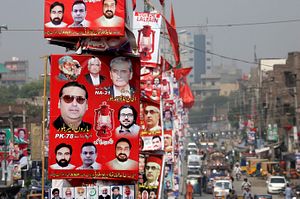The Tuesday night blast that killed Haroon Bilour, a prominent leader of the anti-Taliban Awami National Party (ANP) along with 20 other people, mostly political activists, in Pakistan’s northwestern town of Peshawar, was the first major incident of election-related violence just weeks before the July 25 polls.
Unlike in the previous campaign, in spring of 2013, when the Tehrik-e-Taliban Pakistan (TTP) enjoyed strongholds in the tribal region bordering Afghanistan, campaigning for this year’s parliamentary elections had remained peaceful. That’s mainly because, as per claims by the Pakistani security agencies, the Taliban have been defeated and pushed across the border into Afghanistan.
According to the Islamabad-based Institute of Peace Studies, a total of 148 attacks were carried out against political leaders, workers, and election candidates from January to May 15, 2013, killing 170 people and injuring 743. Of the 148 attacks, 37 were carried out against the ANP, and 12 each against the Pakistan People’s Party (PPP) and the Muttahidda Qaumi Movement (MQM).
The TTP, at that time, was strong enough to launch attacks in the cities and target the political leadership using their strong bases in the tribal areas. However, since the much-hyped operation Zarb-e-Azb, which displaced over a million people in June 2014, the TTP is believed to have been crushed and their remnants pushed across the border into Afghanistan.
A further blow was inflicted by remotely operated drones killing some of the top TTP guns, such as Mullah Fazlullah, Umar Rahman alias Ustad Fatih, and Khalid Sajna, over the past few months. However, the TTP’s claim of credit for July 10 suicide attack, targeting a key leader deep in the city of Peshawar, is nothing but a warning signal indicating that either the group has not been fully defeated, or the claims about its defeat were false.
Suspicions have already been expressed and objections have been raised by major political parties about the transparency of the upcoming polls, mainly because of the hyper-active judiciary and the so-called “unseen hands” at work behind the scenes. This week’s attack on the ANP gathering shattered hopes of holding the July elections in a peaceful environment.
Just a day before the July 10 suicide attack that killed Haroon Bilour, his uncle Ghulam Ahmad Bilour had told the Pashto-language Radio Mashaal that the security environment is far better than 2013 and his party will achieve the best possible results this time.
The Awami National Party was target of Taliban attacks during the run-up for May 2013 elections. Such was the level of threat that many of the party’s leading candidates restricted their electioneering to their houses while some others opted to address gatherings via Skype. As a result, the party, which was the top seat winner in Khyber Pakhtunkhwa in 2008 election, bitterly lost to the Pakistan Tehreek-e-Insaaf (PTI) or justice movement of former cricket star Imran Khan.
Why Does the TTP Target the ANP?
The ANP’s opposition to the Taliban dates back to 2008 when the party came into power in Khyber Pakhtunkhwa province following the January 2008 elections.
One of the ANP’s immediate steps was to challenge the Taliban expansion in Malakand area, where the slain TTP chief Mullah Fazlullah had banned girl’s education, forced women not to visit the markets, and forcefully stopped people from listening music even inside their houses.
Fazlullah had gained power in the Swat area of Malakand during the government of the religious parties’ alliance, the Muttahidda Majlis-e-Amal, from 2002 to 2007 in Khyber Pakhtunkhwa (then North Western Frontier Province).
The ANP leadership not only vocally supported the 2008/2009 anti-Taliban military operations in Swat, while other political parties, including the PTI and the Pakistan Muslim League of Nawaz Sharif, shied away from openly condemning the Taliban activities but also voiced support for the U.S. drone strikes that killed the majority of the TTP leadership in the tribal areas.
The TTP retaliated by targeting ANP leadership in Swat, Peshawar, and other cities of Pakistan. ANP chief Asfandyar Wali Khan had narrowly escaped a suicide attack at his house in 2008. In July 2010, the Taliban killed the only son of ANP stalwart and then-provincial information minister Mian Iftikhar Hussain. Bashir Ahmad Bilour, then a senior minister in the Khyber Pakhtunkhwa cabinet and father of Haroon Bilour, was killed in a suicide blast in December 2012.
Bashir Bilour’s elder brother Ghulam Ahmad Bilour narrowly escaped a suicide attack in April 2013 that killed 18 people. Haroon Bilour, who was targeted in the July 10 attack, had already survived two attempts on his life.
Just like in the May 2013 parliamentary elections, it is unlikely that the ANP will be able to get a level playing field in this year’s polls. The Taliban, while claiming responsibility for the Tuesday night attack, warned people against joining the ANP gatherings. The party leadership, however, is determined to continue with their anti-Taliban stance.
Although other political parties have condemned the attack that killed Haroon Bilour, their condemnations, like in the past, are mostly generalized, without naming the TTP.
Daud Khattak is Senior Editor for Radio Free Europe Radio Liberty’s Pashto language Mashaal Radio. Before joining RFE/RL, Khattak worked for The News International and London’s Sunday Times in Peshawar, Pakistan. He has also worked for Pajhwok Afghan News in Kabul. The views expressed here are the author’s own and do not represent those of RFE/RL.

































